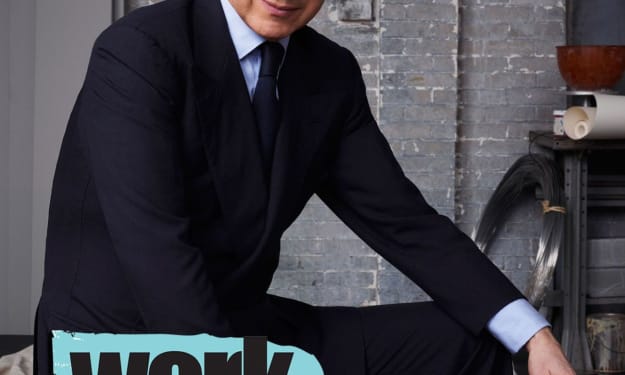Fantastic Cases in Failure: The Failure Paradox
Course Review

Introduction
Over the course of [the] semester I have learned a lot about how to fail correctly and move on from failure, but there are three different areas from this class in which I think I have learned the most. I still have a lot of work to do if I want to apply what I have learned, but I will try to use what I have learned successfully. Even if I do fail, a lot of what I have learned in this course is about moving on from failure and learning from mistakes, so I can continue to apply what I have learned even then.
Change and Innovation
The first of these areas was change and innovation. Before taking this course, I would have thought about change in a negative light. I had the opinion of “why fix what is not broken?” I think that humans are, by nature, habitual people and breaking away from our habits can cause stress. As a personal example, I graduate in the spring from SCSU. Up until this class, I was very nervous about this change in my life and was scared to move on into the ‘real world.’ Graduation still makes me nervous, but through this course I have learned more about how change does not have to be bad, and that even if I do fail in the real world there are ways to move on from that.
Companies and businesses also have to have this mindset. Markets are constantly changing and so businesses need to keep up with their markets. Not only does this mean businesses need to change in order to survive, it also means that they might fail along the way with those changes sometimes. Businesses need to know that failure is not the end of the line for the company as long as they can move on effectively.
When it comes to a company’s success, change and innovation usually relies more on the mindset of the employees rather than the product they are selling. If a company is selling something that is exactly like every other product out there, it is the branding of the company and the people that work there which determines whether the market will buy their product.
Our discussion in class revolved a lot around whether new employees and old employees could get along, especially when age becomes a factor.
Just the interchange between old and new designers can help generate new ideas from old ones. That is not to say that companies should only look to the past, … companies will be in the best position to get the most out of the ideas they invent. (Blanding 2)
Even though bringing in new and younger employees might seem like a bad thing to older employees, the change that the new employees have to offer can be very beneficial to a company as long as both sides are willing to work together and learn from each other.
Since taking this course, I have found that change is inevitable and fighting change in my personal and business life is not going to make anything easier. Using my graduation as an example again, I have been planning on graduating for a long time now. No matter how far off graduation seemed, it was an inevitable conclusion eventually. This change in my life might be hard, but it is what I want to do so I need to face it head on.
Innovation is slightly different than change, but I have also learned about how innovation can impact my life as well. Along with change in business, and new employees helping old ones, comes the possibility for innovation. The creation of new ideas goes hand in hand with change and sometimes those new ideas will be good and sometimes they will not, but along the same idea as change not always being negative, neither is innovation. Plus, innovation can help a business that has failed in a change by helping them change again in a positive way.
As an example of this, if there is a company that brought in a new marketing team to try and change its image- and that new image failed; going back to how the company was before is not going to solve the problems that caused the initial call for change. Innovation and new ideas will hopefully bring about a second change (possibly a secondary rebranding) that may help the company succeed. That takes moving on from failure and not giving up after the first marketing team failed.
Personally, I think the part about innovation has not yet applied to me. I am not at a point in my job in which I get to create a lot of new ideas. However, I think that knowing these important pieces about innovation will help me when I get to that point. Knowing that innovative thinkers are important to a company will also keep me thinking about new ideas even if they are not always implemented or asked for. I know that at some point I will be the new person in a company and will need to prove my value to older or more experienced employees and that is when thinking of new ideas while still showing my willingness to learn from them will become important.
Leadership
Another section of this course that I think I have learned quite a bit about is leadership. My opinion on leadership has not changed much over the course of the semester, but I do think my opinion on what makes a good leader has changed. Leaders need to help their subordinates to succeed, but if their subordinates do fail, they need to handle the situation correctly and show their subordinates how to learn from that failure. They also need to analyze how their leadership failed and what they learned from the failure, too.
Part of learning from failure as a leader or manager would be learning how to handle a situation more effectively in the future. If something goes wrong it is easy to point fingers, but I think a good leader needs to own up to their failures and say how they can correct their actions in the future. Or if it was not something they personally did wrong, being able to step in and say, “I can fix this” when everyone else is pointing fingers is also important to a good leader.
Before this course, I assumed a good leader did not make mistakes or made as few as possible. That, however, is not the case. In our class article, if you have to fail, fail forward, it notes the importance of learning from failure as something that is required for success. Maddock, author of that article, says,
Failure isn’t fatal; in fact, it is actually REQUIRED for innovation success—as long as you don’t freak out, make catastrophic mistakes or (ironically) fail to learn from it. (Maddock 1)
The importance of failing is basically what this course is about, but I especially think it is important for leaders to understand so that they can help others to fail correctly as well.
I also think that learning along the way is important and making minute changes during the process of something as a leader can make or break a project. During the school’s production of Hamlet, for example, I helped with costumes. Looking at the original sketches by our designer now, a lot has changed. However, the theme and idea behind the drawings is still there. She changed a lot of her ideas along the way to both make them more manageable for us as we were making them, and also more realistic to her vision of what the ‘world’ of Hamlet would look like. Our designer lead many small groups to succeed on making her vision come true, but she also had to make changes along the way in order for us to succeed properly.
Recently, since I’ve redefined for myself what makes a good leader, I have tried to fit that mold instead of my old idea of what a leader is. Instead of trying to avoid failure altogether, I have been trying to embrace it more in everyday life and understanding that failure does not say anything bad about me and in fact can help me to do better in the future.
As a teacher’s assistant, I have also been trying to instill that in the students I help. Just because a student fails one quiz or test does not mean they cannot learn and also does not mean they will fail the class unless they do not try to succeed. As a teacher’s assistant, part of my job is to help other students try to succeed. Overall, I have not seen a lot of changes- I do not help that many students. However, I think that my change in attitude has helped the few students that I do assist and has shown to be more effective in leading them to success.
Happiness
The third and final piece of this course I feel as if I’ve learned a lot about is happiness. Before taking this course I thought personal happiness relied on personal success. I used to think that in order to be happy you had to also be successful. Of course this was my own defined version of success, it did not necessarily mean monetary success, but whatever the individual in question thought made them successful. I suppose, in a way, this view of happiness is not completely different from how I view success now. Now, I simply consider failure as a part of that success.
I used to view failure as unimaginable towards success and thus the opposite of happiness. I have learned that you can be happy when you fail, and not just because you can see it as a learning opportunity, rather because you know it is bound to happen at some point and so you might as well be happy about it. It’s about taking things in stride and accepting losses, but also moving on from those losses in an effective way. Turning a negative into a positive, in a way, is what I have learned most from this course overall.
At the beginning of this semester, the theater department put on their production of Avenue Q. In this musical there is a song called “schadenfreude” which is defined in the song as “happiness at the misfortune of others” (Lopez n.p.). This may seem like a strange concept, but the song is basically about finding the good in the bad and enjoying life as it is, rather than just enjoying the good parts of life. At the end of the song, the two characters decide that, by being failures, they “provide an important service to society” i.e. people to laugh at. I am not sure I completely agree with the part saying they should be mocked for their lack of success, but I think the idea of being positive despite being in a bad situation is important.
Along with the idea that failure is not the opposite of success, Abraham Lincoln could have given up many times in his career before he became president. (Fehrenbacher 1). The idea is that failure is not a stopping point and even if you are disappointed in your failure, it should not make you unhappy. Failure should be an incentive to try a different approach or try again with a better solution in the future. Life is supposed to be a journey and if everything were easy or if we gave up every time something got difficult, then we would not have succeeded in anything. No famous person that has experienced what many people would call a failure has just accepted that failure. They have moved on from that failure, using it as motivation to work hard. That is part of the reason they are successful and we know about them.
As for myself, I do not really think I have failed much this semester, but knowing that it is okay to fail has certainly made me relax and be generally happier, without the same amount of pressure I put on myself before. This is not to say I am no longer trying, or that I do not want to succeed. I am simply saying that I push myself to succeed for other reasons than the threat of failure. Even before this class I thought I was a generally happy person, but I am still learning to take things in stride and be happy despite there being reasons not to be.
I am also trying to apply that same sense of happiness to my work. I am not always going to be happy at work, but I should still be satisfied with accomplishing my goals- even if I do not enjoy some of the steps along the way. I should also be able to be a generally happy person even if I do not enjoy what I am doing at the time. Happiness as an emotion and enjoyment do not have to be mutually exclusive.
Happiness is probably the one topic I would still like to learn more about. I think that happiness is relative and that you have to often tell yourself to be happy in your situation. There are people who seem to me to have everything but are unhappy, and there are people who seem to me to have nothing but are very happy. Happiness is about learning to be okay with what life has given you while still trying to achieve more for yourself. I think if I were to continue to research happiness I would like to find out if there are different types of happiness, like happiness with your work versus happiness in daily life outside of work for example. If so, I wonder why we might see those two things as different, or if happiness is just a choice in a way in which we see the world.
Conclusion
In summary, this semester I have learned about happiness, leadership skills, and change as they all apply to failure and success. Also, I have learned that just because these things may impact my own success or a business’ success does not mean that is the end point. These three sections from class can help both a business and a person move on from failure, as well.
Works Cited
Blanding, M. (n.d.). Harvard Business School. Retrieved November 26, 2014, from http://hbswk.hbs.edu/item/7647.html
Fehrenbacher, D. (1992, January 1). Abraham Lincoln's "Failures" and "Successes" Retrieved November 27, 2014, from http://www.abrahamlincolnonline.org/lincoln/education/failures.htm
Lopez, R., & Marx, J. (2010). Avenue Q, the musical: The complete book and lyrics of the Broadway musical. Milwaukee, WI: Applause Theatre & Cinema Books.
Maddock, M. (n.d.). If You Have To Fail -- And You Do -- Fail Forward. Retrieved November 26, 2014, from http://www.forbes.com/sites/mikemaddock/2012/10/10/if-you-have-to-fail-and-you-do-fail-forward/
About the Creator
Haley Bice
Haley received her MA in Business Design and Arts Leadership from SCAD eLearning in 2018. She also has a BA in Art History with a Fine Art minor from SCSU and an ASc in Graphic Design from RCTC, both located in Minnesota.






Comments
There are no comments for this story
Be the first to respond and start the conversation.